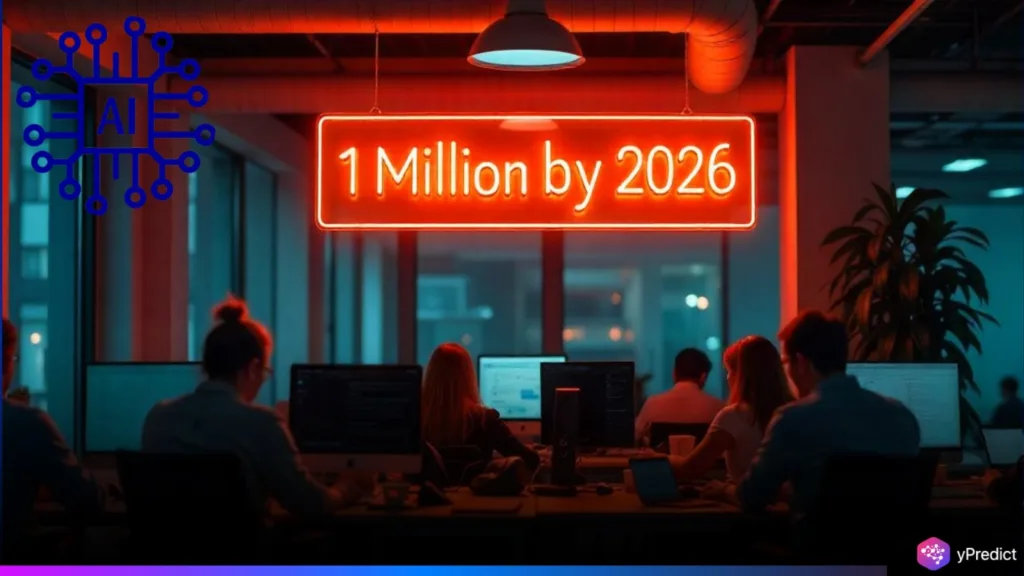
India is experiencing a surge in demand for AI professionals, with projections estimating one million experts needed by 2026. AI is rapidly transforming industries such as healthcare, finance, agriculture, and manufacturing through automation and smarter data-driven decision-making processes. A recent report from MeitY identifies AI as a major driver of India’s economic growth and future digital innovation. To bridge the talent gap, India must invest strategically in education, workforce skilling programs, and digital infrastructure development nationwide.
Education Reforms to Meet India’s AI Talent Demand
According to The Economic Times, India is reshaping its education and workforce strategies to meet the rising demand for Artificial Intelligence (AI) professionals. According to the Ministry of Electronics and IT’s report, India’s AI Revolution: A Roadmap to Viksit Bharat, the country will require one million AI-skilled workers by 2026 to realize its economic ambitions. As India aims to become a $23–35 trillion economy by 2047, the urgency to build a future-ready workforce is accelerating, particularly within engineering education, which remains central to driving the nation’s digital transformation.
Engineering institutes across India are updating courses to match evolving technologies and industry demands in the digital transformation era. AICTE announced that approved B.Tech seats for 2024–25 have increased to 1.49 million, marking a 16% rise overall. This growth is fueled by over 50% expansion in tech programs like AI, machine learning, data science, and cybersecurity. Programs in cloud computing, blockchain, and related technologies are also seeing higher enrollment, reflecting strong student and industry interest alike.
This shift reflects rising industry demand for professionals skilled in advanced, emerging technologies across various sectors of the economy. Institutions are moving beyond traditional STEM education by integrating the arts to build a more holistic, STEAM-based learning approach. The STEAM model promotes creativity, communication, and ethical reasoning alongside technical skills needed for success in modern tech-driven workplaces.
Government Steps Up to Address India’s AI Talent Demand
Under the IndiaAI Future Skills initiative, the government is expanding AI education across undergraduate, postgraduate, and PhD academic programs nationwide. It offers fellowships to full-time PhD scholars in AI at institutions ranked in the top 50 by NIRF. To boost accessibility, new AI and data labs are being set up in Tier 2 and Tier 3 cities. A model IndiaAI Data Lab is already operational at NIELIT Delhi, serving as a blueprint for future infrastructure expansion.
IIT Madras offers online AI courses through platforms like SWAYAM Plus to make learning accessible to diverse academic backgrounds. Universities now use experiential learning by blending classroom teaching with internships, research projects, and industry exposure for hands-on skill development. This approach equips students with practical knowledge and real-world problem-solving abilities needed in today’s fast-evolving artificial intelligence job market.
At Mahindra University, for example, Vice Chancellor Dr. Yajulu Medury emphasizes the importance of combining rigorous academic knowledge with experiential learning. He said,
We see a growing need to foster an innovation ecosystem driven by AI, for today’s youth, by providing experiential learning opportunities such as internships, global immersion programmes, and research initiatives. At Mahindra University, we believe academic excellence is achieved when rigorous foundational knowledge is seamlessly integrated with real-world applications.
Industry Growth and Global Standing
The India Skills Report 2024 by Wheebox projects that India’s AI industry will reach $28.8 billion by 2025, growing at a compound annual growth rate (CAGR) of 45%. The AI-skilled workforce has expanded 14-fold from 2016 to 2023, positioning India among the top five fastest-growing AI talent hubs globally, alongside Singapore, Finland, Ireland, and Canada.
As AI continues to reshape productivity, operations, and innovation, preparing a future-ready workforce is imperative. Institutions are embedding research-driven curricula, industry mentorship, and global exposure into their programs, focusing on areas like Extended Reality (XR), data visualization, ethical AI, and digital manufacturing.
India’s ambitious desire to become a global AI leader is dependent on its capacity to develop a talented, future-ready workforce. With strong government initiatives, university reforms, and industry partnerships, the country is well-positioned to satisfy the predicted demand for one million AI specialists while also accelerating economic and technical growth.






